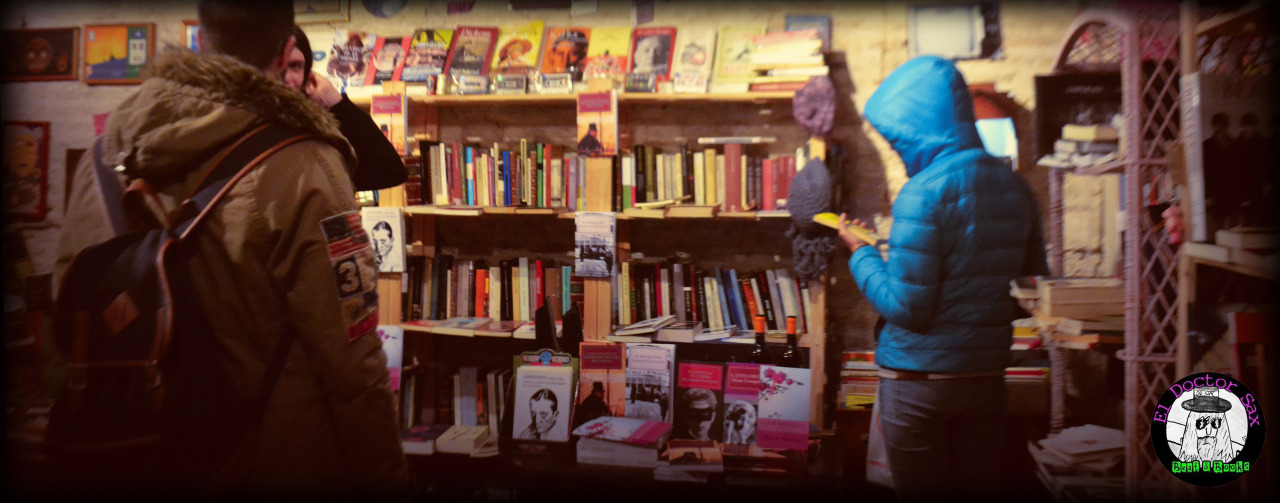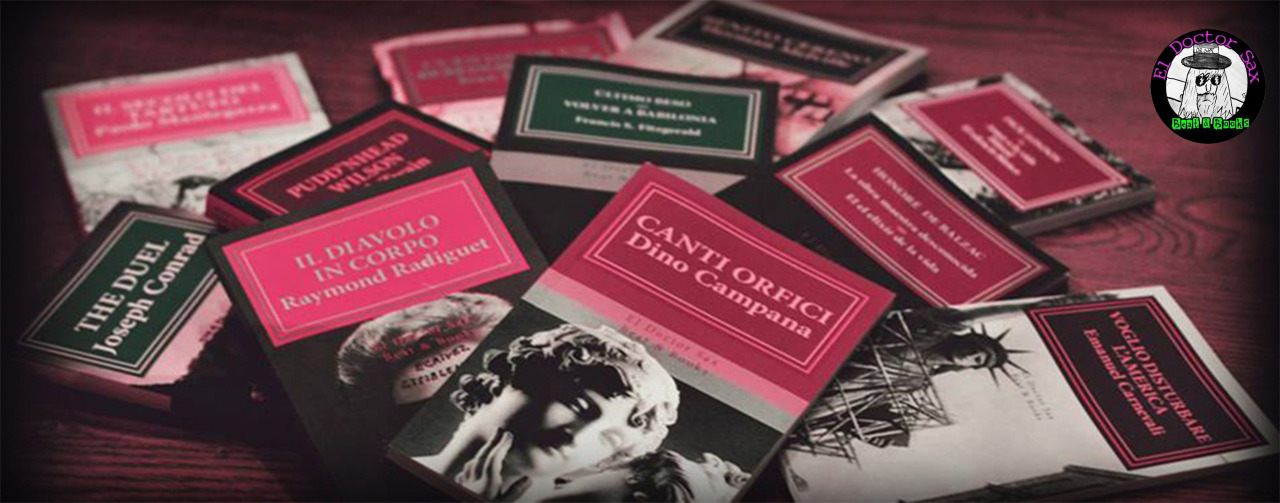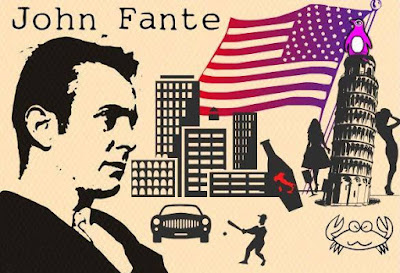Showing posts with label Literature. Show all posts
Showing posts with label Literature. Show all posts
01 August 2020
08 May 2020
John Fante, the Most Italian of the American Writers by Gabriele Nero. English Translation by Gaston Gorga
Holden Caulfield, the main character of “The Catcher in the Rye” had a very simple method for judging a writer: “(....) when you're all done reading it, you wish the author that wrote it was a terrific friend of yours and you could call him up on the phone whenever you felt like it. (...)”. Well, personally I would have spent hours listening to John Fante recounting the impossible stories about his family. I would have loved sharing a great spaghetti meal and a good bottle of wine with him, going out partying, or just having a drink together in some absurd bar in the outskirts of Los Angeles.
The story of John Fante (as well as that of Arturo Bandini, his literary alter ego), began in the periphery of the world, in Torricella Peligna, a little village in the mountains of Abruzzo, from where Nicola Fante, his bricklayer father, emigrated at the beginning of the twentieth century to seek fortune in America.
The Fante family settled in Denver, Colorado, in the Midwest region, on the outskirts of the American Dream. In short, in the American Abruzzo. Here, the Fante family built their own little Italy with red wine and spaghetti, gambling debts, old ladies dressed in black, Sunday masses and profanities in Italian.
But John Fante, in spite of being in his twenties during the Great Depression, was ambitious, and never stopped believing in his talent. Both Fante and Bandini had a big dream in common: Los Angeles, California.
In all of Fante´s stories, even those in which the main character is not called Bandini (in some novels the main character is called Henry Molise), there is always a bus to catch, a journey to begin, a place to arrive, a city where to prove the worth of Arturo Bandini, even though, paradoxically, he seldom manages to achieve this. Baseball player, Hollywood screenwriter, writer, altar boy: the protagonist of his stories always has the typical Italian presumption of being the best at everything he does, but for different reasons (a combination of fate, humble origins and his Italian origin and Catholic background certainly does not help), he is never able to prove it. After all, his father Nicola Fante would have been the best bricklayer in Denver... if only they had hired him! John
Fante did not accomplish international fame in life. But one should not picture the typical bohemian writer who died poor and amid hardships. Eventually, thanks to his distinctively Italian perseverance, Fante was successful in the world of Hollywood as a screenwriter, and lived the second part of his life as a rich American bourgeois, with a beautiful wife, four children, a two-storey villa in Malibu and a convertible car.
“Bandini is a terrone !” (despective nickname given by the North Italians to the South Italians, to indicate their loud and brash character), said Italian songwriter Vinicio Capossela, who was one of the first Italians to discover Fante. How to blame him? Like all terroni , Bandini is stubborn, arrogant, a mummy's boy, a womaniser and a drinker, but, at the same time, he is an authentic person, generous, instinctive and full of passion. He is a professional in the art of getting by and boasting his presumed talent, even though no one has any proof of it. But he’s so adamant about it, that he ends up persuading the reader.
Like in a transfert , the reader finds himself more convinced by Fante’s style, a master of synthesis and elegance, than Bandini’s. In Fante’s prose, the phrases are extremely short, direct and simple, and they follow one another with a frantic rhythm, somewhat reminiscent of a verdict. Reading Fante is easy. His books can be appreciated by a fourteen-year-old boy as well as a grandfather in his eighties, by an occasional reader as well as a philosophy graduate.
Reading Fante is fun and light-hearted. Nevertheless, it also confronts the reader with the will of fulfillment of a generation shaped by history: families dismembered by the first mass migration, the Wall Street Crash of 1929 and two world wars.
On the other hand, I believe Fante’s writings can only be fully understood by someone having directly or indirectly witnessed some form of migration. Furthermore, I don’t believe his works will ever join the pantheon of the American literary canon (being too Italian to be fully understood by contemporary America), the same way he will never be part of the Italian one (he wrote in American English, and was born in Denver, discarded!).
The Italianness of Fante reveals itself mostly as a sense of rebellion. John deeply loves the idea of the mestizo America as the land of dreams, and profoundly despises those Americans who betray these ideals, who discriminate against him, deride him and call him ‘ dago’ . To the smug rich little girl who boasts about her noble descent from Mary Stewart, the little Bandini retorts that he is the great-grandchild of Mingo, a bandit from Torricella Peligna. John idealises Torricella Peligna to the point of making it his identity refuge from where he can defend himself and counter-attack.
Fante’s letters from Italy, collected in the book "Tesoro, qui è tutta una follia!" (It’s all madness here, darling!), where he tells of his travels in Europe between the 1950s and 1960s, are extremely amusing: his bucolic vision of post-Risorgimento Italy fades against the Americanised Rome of the Dolce Vita and the ‘ economic boom ’. While staying in Rome, Fante does not visit Torricella Peligna, despite being just over a hundred miles away, just not to risk becoming disillusioned.
It is perhaps in this non-identity, in this ego that sometimes self-deprecates and sometimes insults, at times Italian, other times American, sometimes conservative and sometimes democratic or anarchist, where the success of the literary character of Arturo Gabriel Bandini lies; unique, true and too modern even for us.
Migrations, wars, second generations (or rather new mixed-race identities), economic crises and the consequent unemployment: these are all issues upon which we are forced to reflect today, perhaps even more than before. One can picture how forty years after his death, the voice of John Fante echoes loudly through millions of readers across the world, who discover the hidden treasure of one the greatest artists of the twentieth century.
What I most admire about Fante, and therefore about Bandini, is his ferocious self-criticism. In fact, just when both John and Arturo seem to have accomplished their dream, they soon realise that perhaps it wasn't quite what they had once envisioned during the cold Colorado nights. Upon reaching California, they begin fantasising about a new life in Rome among ice cream parlours, Via del Corso, and thousands of small Fiat cars sweeping through the narrow streets where not even a mule with a cart would be able to get through.
Even though Bandini had already experienced being cold and hungry during his youth, being marginalised for his Italian origins and finding himself broke and sleeping in abandoned boats by the ocean’s shore, his most bitter pages are undoubtedly those of "Dreams of Bunker Hill", where he describes the frustration of being hired and lavishly paid by a big Hollywood studio not to write. In fact, Bandini loves life too much to be locked inside an office, where he cannot write anything that satisfies neither him nor his producers. "I can't get no satisfaction" would become the anthem of the generation of Fante's children, yet, as the Stones sang, Bandini feels he is wasting his talent, and the only thing he can accomplish there is getting into trouble by seducing secretaries and literary agents. So Bandini, like a Franciscan, gives up everything and goes back to the cheap motel room he had left behind and starts writing.
The Bandini saga culminates in the very moment that the literary character and the writer find themselves for the first time in front of a blank page and a typewriter. This is an excerpt from that moment, one of the last paragraphs that John, now blind and with his legs amputated because of diabetes, dictated to his wife Joyce in 1982: “But suppose I failed? Suppose I had lost all of my beautiful talent? (...) What would happen to me? Would I go to Abe Marx and become a busboy again? I had seventeen dollars in my wallet. Seventeen dollars and the fear of writing. I sat erect before the typewriter and blew on my fingers. Please God, please Knut Hamsun, don’t desert me now. I started to write and I wrote (...)”.
John Fante tells us that it doesn't matter if you are Italian, Filipino or American, if you are an old person or a teenager, penniless or rich with a villa in Malibu. What matters is to stay alive, to have a California to dream of and a Torricella Peligna to always carry inside.
by Gabriele Nero
English Translation by Gaston Gorga
26 November 2017
MOLESTANDO A AMÉRICA~DISTURBING AMERICA - Emanuel Carnevali (ESPAÑOL - ENGLISH)
INTRODUCCIÓN Y TRADUCCIÓN:
JUANJO MONSELL
(ESPAÑOL - ENGLISH)
Emanuel Carnevali nació en Florencia el 4 de diciembre de 1897. Su infancia transcurrió entre Pistoia, Biella y Cossato. Tras la muerte de su madre, en 1911 Carnevali obtuvo una beca en Venecia, donde pasó dos años antes de ser expulsado del colegio.Tal y como narra él mismo en su novela “Il primo dio”, decidió emigrar a los Estados Unidos en 1914, con solamente dieciséis años, a causa de los continuos enfrentamientos con el padre.
Vivió hasta 1922 entre Nueva York y Chicago, al principio sin conocer una sola palabra de inglés y desempeñando trabajos temporales: friegaplatos, dependiente de una tienda de comestibles, camarero, limpiador de suelos, paleador de nieve, etc… Sufrió el hambre, la miseria y privaciones de todo tipo. Con el tiempo aprendió la lengua (leyendo los carteles comerciales de Nueva York), comenzó a escribir y a enviar sus versos a todas las revistas que conocía. Inicialmente rechazadas, sus poesías comenzaron poco a poco a ser publicadas y Carnevali se dio a conocer en el ambiente literario y trabó amistad con varios poetas como Max Eastman, Ezra Pound, Robert McAlmon y William Carlos Williams. Olvidado por la crítica y el público, ha dejado un pequeño pero tajante y fuerte rastro en la literatura americana del siglo XIX. Viviendo en la miseria, pasando de un trabajo a otro, de un amor a otro, frecuentando prostitutas y matones, logró ser parte, como extranjero, de la renovación de la vanguardia literaria americana de la época. Afectado por una enfermedad nerviosa, en 1922 volvió a Italia, donde vivió sus últimos veinte años entre hospitales y clínicas donde continuó escribiendo. Murió el 11 de enero de 1942 en la Clínica Neurológica de Bolonia.
Este volumen, el primer libro de Carnevali traducido al español, recoge toda su obra poética e incluye poemas inéditos. Edición bilingüe español-inglés.
"Vengo de América, donde todo
Es más grande, pero menos majestuoso;
Donde no hay vino.
Llego a la tierra del vino –
Vino para el alma.
Italia es una pequeña familia;
América es una huérfana
Independiente y arrogante,
Demente y sublime,
Sin tradición para guiarla,
Precipitándose de cabeza en una carrera loca que llama progreso.
América tremendamente laboriosa,
Constructora de las ciudades mecánicas.
Pero con las prisas la gente se olvida de amar;
Pero con las prisas uno abandona y pierde la bondad.
Y el hambre es el patrimonio del emigrante"
Emanuel Carnevali
Subscribe to:
Comments (Atom)























